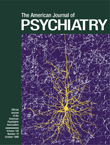Effectiveness of Partial Hospitalization in the Treatment of Borderline Personality Disorder: A Randomized Controlled Trial
Abstract
OBJECTIVE: This study compared the effectiveness of psychoanalytically oriented partial hospitalization with standard psychiatric care for patients with borderline personality disorder. METHOD: Thirty-eight patients with borderline personality disorder, diagnosed according to standardized criteria, were allocated either to a partially hospitalized group or to a standard psychiatric care (control) group in a randomized controlled design. Treatment, which included individual and group psychoanalytic psychotherapy, was for a maximum of 18 months. Outcome measures included the frequency of suicide attempts and acts of self-harm, the number and duration of inpatient admissions, the use of psychotropic medication, and self-report measures of depression, anxiety, general symptom distress, interpersonal function, and social adjustment. Data analysis used repeated measures analysis of covariance and nonparametric tests of trend. RESULTS: Patients who were partially hospitalized showed a statistically significant decrease on all measures in contrast to the control group, which showed limited change or deterioration over the same period. An improvement in depressive symptoms, a decrease in suicidal and self-mutilatory acts, reduced inpatient days, and better social and interpersonal function began at 6 months and continued until the end of treatment at 18 months. CONCLUSIONS: Psychoanalytically oriented partial hospitalization is superior to standard psychiatric care for patients with borderline personality disorder. Replication is needed with larger groups, but these results suggest that partial hospitalization may offer an alternative to inpatient treatment.



